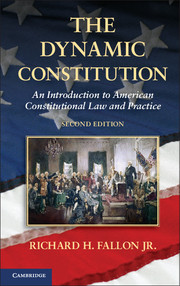Book contents
- Frontmatter
- Contents
- Preface to the Second Edition
- Preface to the First Edition
- Prologue: The Affordable Care Act and Other Vignettes
- Introduction
- Part I Individual Rights under the Constitution
- 1 Freedom of Speech
- 2 Freedom of Religion
- 3 Protection of Economic Liberties
- 4 Fundamental Rights “Enumerated” in the Bill of Rights
- 5 Equal Protection of the Laws
- 6 “Unenumerated” Fundamental Rights
- Part II The Constitutional Separation of Powers
- Part III Further Issues of Constitutional Structure and Individual Rights
- Appendix: The Constitution of the United States
- References
6 - “Unenumerated” Fundamental Rights
Published online by Cambridge University Press: 05 May 2013
- Frontmatter
- Contents
- Preface to the Second Edition
- Preface to the First Edition
- Prologue: The Affordable Care Act and Other Vignettes
- Introduction
- Part I Individual Rights under the Constitution
- 1 Freedom of Speech
- 2 Freedom of Religion
- 3 Protection of Economic Liberties
- 4 Fundamental Rights “Enumerated” in the Bill of Rights
- 5 Equal Protection of the Laws
- 6 “Unenumerated” Fundamental Rights
- Part II The Constitutional Separation of Powers
- Part III Further Issues of Constitutional Structure and Individual Rights
- Appendix: The Constitution of the United States
- References
Summary
“[L]iberty” is not a series of isolated points pricked out in terms of…freedom of speech, press, and religion…and so on. It is a rational continuum which, broadly speaking, includes a freedom from all substantial arbitrary impositions and purposeless restraints.
– Justice John Marshall HarlanThe Court is most vulnerable and comes nearest to illegitimacy when it deals with judge-made constitutional law having little or no cognizable roots in the language or design of the Constitution.
– Justice Byron WhiteAS THE SUPREME COURT NOTED IN THE FIRST SENTENCE of its opinion, the case of Skinner v. Oklahoma (1942) “touche[d] a sensitive and important area of human rights.” The state of Oklahoma sought to sterilize Jack T. Skinner against his will. In the state's view, Skinner was a “habitual criminal,” convicted three times of crimes involving “moral turpitude” – twice for “robbery,” once for stealing chickens. Oklahoma's “Habitual Criminal Sterilization Act” called for repeat offenders to be sterilized in order to stop people with manifest criminal tendencies from passing those tendencies to fut-ure generations.
- Type
- Chapter
- Information
- The Dynamic ConstitutionAn Introduction to American Constitutional Law and Practice, pp. 191 - 224Publisher: Cambridge University PressPrint publication year: 2013



